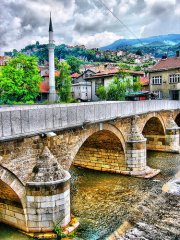By IRR European News Team
31 March 2010, 2:00pm
Extreme Right parties are hoping to use the citizens’ initiative of the Lisbon Treaty to ban the construction of minarets across the EU.
IN February, Liz Fekete warned in a briefing paper from the European Race Audit that the extreme Right in Europe could well use the direct democracy provision of the Lisbon Treaty to pursue racist aims. Unfortunately she has been proved right. Last Saturday, at an anti-minaret conference hosted by a German right-wing group called Pro-NRW, delegates from the Belgian Vlaams Belang, Geert Wilders’ Dutch Party for Freedom, Pia Kjaersgaard’s Danish People’s Party, the Front National and other extreme Right parties across Europe discussed how to begin collecting the one million signatures required to push through a Europe-wide ban on minarets.
Filip Dewinter, leader of the Vlaams Belang in the Flemish parliament has told der Spiegel Online that ‘minarets are not part of our heritage’. Despite the fact that the European Parliament has yet to complete the legal framework for citizens’ initiatives, Dewinter appears to relish the idea of the threat. ‘Brussels is afraid of such a referendum’, he said ‘and they know it will be a very powerful weapon in the hands of right-wing conservative parties … the collection of signatures will be a political campaign in itself.’
The Pro-NRW, organisers of the conference, is seeking to establish a political foothold in Germany ahead of state elections and is apparently testing the waters to see whether populist Islamophobia (as used in the Netherlands, Austria, Belgium and elsewhere) can be exploited in Germany to effect.
The Institute of Race Relations is precluded from expressing a corporate view: any opinions expressed are therefore those of the authors. RELATED LINKS Download a copy of ERA Briefing Paper no. 1: The Swiss referendum on minarets: background and aftermath (pdf file, 152kb)Download a copy of ERA Briefing Paper no. 2: Direct democracy, racism and the extreme Right (pdf file, 200kb)
Read an IRR News story: ‘How the extreme Right hijacks direct democracy’
Read an IRR News story: ‘Swiss poll crushes minarets’
, 31 March 2010


